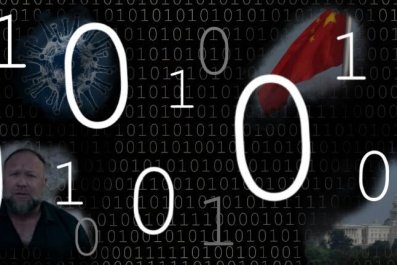The postponement of a meeting between senior U.S. officials and counterparts in Beijing over a surveillance balloon detected over the continental United States may further dash the hopes of American citizens held for years in China.
Secretary of State Antony Blinken was set to travel to Beijing this weekend for sit-down talks with Chinese officials as a follow-up to presidents Joe Biden and Xi Jinping's meeting late last year. He would have been the first top U.S. diplomat to visit the country in five years.
But the presence of the spy balloon, which was shot down by the U.S. Air Force on Saturday, has forced Washington to push back the talks to an unscheduled date—a crushing blow to the families of American detainees who had hoped to use the occasion to throw light on their sentences. For now, tensions between the two superpowers remain high despite China's unusually conciliatory step of expressing "regret" over the incident.

When the talks are rearranged, families will be expecting America's top diplomat to press his Chinese counterparts on the wrongful detention of U.S. citizens.
These Americans are held in Chinese prisons and detention centers, live under house arrest, or are subject to exit bans. Some were persecuted on suspected religious grounds; others are the likely victims of geopolitics. All are at the mercy of China's opaque criminal justice system, often with no recourse to legal assistance and little contact with home.
More than 200 U.S. citizens at various stages of prosecution remain wrongfully detained in China but the exact number is unclear, according to John Kamm, who chairs the Dui Hua Foundation, a San Francisco-based nonprofit seeking clemency and better treatment for at-risk detainees, American or otherwise.
"I consider Americans subject to coercive measures as political prisoners due to the state of U.S.-China relations. In short, they are political prisoners because their imprisonment and treatment are related to the poor state of political relations between the two countries," Kamm told Newsweek.
The families argue the insubstantial charges against their loved ones have never stood up to scrutiny. Convictions for political crimes are rare.
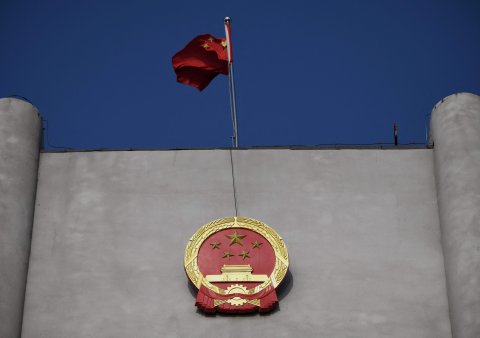
'Politically motivated charges'
Harrison Li said his father, Kai Li, 60, is the only American being held in China on state security charges. The Long Island businessman was arrested during a visit to Shanghai in 2016, held incommunicado for months, and given a 10-year sentence for espionage at a secret trial in 2018.
The state secrets he was accused of handling were freely available online, his lawyer said. The State Department considers Kai Li among those wrongfully detained by Chinese authorities. "That means the U.S. government credibly believes the charges against my father are politically motivated," Harrison Li, 25, told Newsweek.
Kai Li's only contact with his family in New York is through monthly phone calls that last mere minutes. The prison stopped visits during the COVID-19 pandemic, making it difficult to credibly assess his condition and ensure his rights are being guaranteed.
"My father has not received an in-person visit from the U.S. Consulate in Shanghai in over three years," said Harrison Li, who believes he could also be detained if he tries to see his parent in person.
The experience is similar for Alice Lin, 40, who hasn't seen her father, Orange County pastor David Lin, 68, since her college graduation. Having traveled to China to support local churches since the 1990s, he was placed under house arrest in Beijing in 2006. Three years later, he was jailed for life for contract fraud. The State Department also considers him wrongfully detained.
"We talk to my dad twice a month for five minutes. When he was first detained, my brother and I would alternate every other year to try to visit my dad in person," Alice Lin told Newsweek. Her father is approaching 16 years in detention, but it wasn't until 2019 that the family chose to go public out of concern for his safety and health.
"At the end of 2018, he sent home his Bible. The best analogy I can make is it's like a man in a desert sending off his only bottle of water. My dad has a very strong faith and is stoic when it comes to himself," she said. "We do know over the years that he has lost at least five teeth, probably due to poor nutrition and hygiene conditions."
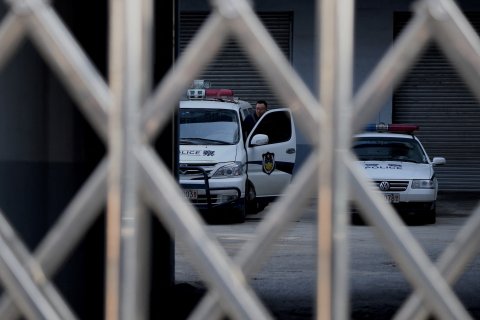
The U.N.'s Working Group on Arbitrary Detention lists Kai Li as one of two U.S. citizens whose detention in China violates international law. The other is Mark Swidan, a Houston man who was arrested on flimsy drug-related offenses in 2012 and in 2019 sentenced to death with reprieve.
Sen. Ted Cruz of Texas took to the Senate floor on Wednesday to describe Swidan's ongoing detention as "a gross miscarriage of justice." The lawyer-turned-lawmaker called on the Biden administration to "use all the tools at our disposal to secure his release."
Caroline Cai, 23, daughter of Henry Cai, 61, has appealed to the same U.N. body in the hope of convincing the independent panel to investigate her father's case. The California businessman has been the subject of an exit ban for more than five years—a likely record—since he was prevented from leaving Beijing at the end of a business trip in late 2017.
Henry Cai faces no charges; he's able to walk around freely and contact his family in America, but Chinese courts have barred him from returning home over what they determined was several million dollars worth of outstanding debt, which he argues isn't his to pay.
"My father is being framed for a contrived debt and is being leveraged as a political pawn between the U.S. and China. There is no transparent due process under the Chinese legal system," Caroline Cai told Newsweek.
"I have considered visiting China out of pure desperation to see him, but I am advised that it is not safe and that I may be at risk of an exit ban as well," she said. "It is complicated—I am Chinese and love China, and I hope to return one day, but I cannot see that in my future anymore."
'Additional Scrutiny and Harassment'
The State Department's travel advisory for China now warns of both wrongful detentions and exit bans, which it says are designed to compel individuals to comply with Chinese government investigations by pressuring family members. Beijing also seeks to "gain bargaining leverage over foreign governments" through the travel restrictions.
"In most cases, U.S. citizens only become aware of an exit ban when they attempt to depart the [People's Republic of China] (PRC), and there is no reliable mechanism or legal process to find out how long the ban might continue or to contest it in a court of law," the notice says.
U.S. citizens of Chinese descent and Chinese-American dual nationals, a status China does not recognize, "may be subject to additional scrutiny and harassment," it cautions.
Much of the discussion around Blinken's now-postponed trip to the Chinese capital had focused on broader U.S.-China rivalry and the desire to avert conflict. The Chinese Foreign Ministry didn't respond to Newsweek's questions about detained Americans, but it often says it is unaware of individual cases.
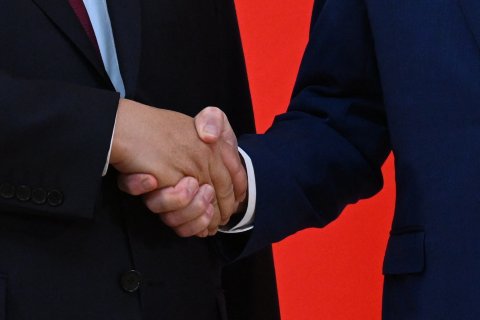
Both Li and Lin had hoped Blinken would raise their fathers' cases, among others, in meetings previously scheduled for next week, but now face disappointment after they were pushed back at the last minute.
"But as I've said recently, we need more than that—a whole-of-government effort going all the way up to President Biden is needed, with concrete actions and a plan to actually bring my dad home," Li said.
Cai said humanitarian appeals sent from Washington on her father's behalf had been "ignored and dismissed" by Beijing in the past. "I implore Secretary Blinken to publicly raise the issue of U.S. citizens detained or subject to exit bans in China during his visit—it is a grave human rights violation and has torn families apart."
A State Department spokesperson prior to the postponement said Blinken remained "personally focused on and prioritizes" the return of wrongfully detained Americans. Biden raised the issue in November when he met Chinese President Xi Jinping, the official said.
"We will continue to advocate on behalf of wrongfully detained U.S. citizens in the PRC and work to support their families. Officials at every level of this administration continually advocate for the release of U.S. citizens wrongfully detained in the PRC," said the spokesperson.
Some view the September 2021 release of Michael Spavor and Michael Kovrig, Canadian nationals held for more than 1,000 days on spying charges, as a turning point in detainee negotiations with China. Biden accused Beijing of using the men as "bartering chips" to secure the return of Huawei executive Meng Wenzhou, who was released from house arrest in Vancouver at the same time.
Last December, the Biden administration exchanged jailed Russian arms dealer Viktor Bout for American basketball player Brittney Griner, who had spent 11 months in a Moscow jail after being found guilty of drug charges.
"I have been getting my hopes up only to be disappointed for more than five years now. At this point, we are praying for a miracle," said Cai. "I cannot contend against a global superpower and the complex geopolitical forces that keep my father and I apart. The grief is endless."
"It gives us a lot of hope and encouragement," Lin said of the recent cases. "It tells us that our government is capable of bringing people home. We've been praying for years and we pray this is that breakthrough moment. My dad has been gone for already too long."
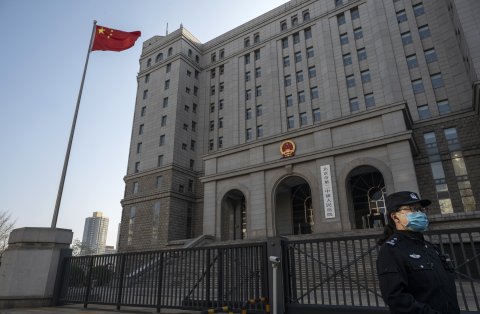
'The More Noise the Better'
Kamm, a former president of the American Chamber of Commerce in Hong Kong, first intervened on behalf of a June 4 protester in 1990. He and Dui Hua, founded in 1999, have advocated for several thousand prisoners in that time, mostly to assist family members or foreign governments.
Dui Hua's political prisoner database, based on official and unofficial records going back four decades, tracks those arrested for non-violent offenses like dissent, religious practices, or activism. Its estimates show more than 7,600 political prisoners are being held under coercive measures.
The organization publishes regular prisoner updates about the fate of political or religious detainees in the country. It is also watching the case of Shadeed Abdulmateen, a Los Angeles resident sentenced to death last year for murder, who, if executed, would become the first American in recent memory to be put to death in China.
Beijing regularly turns its coercive tactics on its own citizens, including from afar. Last August, Chinese authorities placed an exit ban on Florida resident Xie Fang in a bid to compel her husband, former independent bookseller Yu Miao, to return to China to face subversion charges.
Last month, Yu published an appeal his wife wrote to China's public security ministry, in which she suggested she was being held hostage by the state over her husband's unproven crimes. Local authorities told her the decision to go public would complicate her case, Yu said.
In Kamm's experience, however, media exposure can help families. "The more noise the better," he said.
Do you have a tip on a world news story that Newsweek should be covering? Do you have a question about China? Let us know via worldnews@newsweek.com.
Update 02/05/2023 3:30 a.m. ET: This story was updated with the latest news about the Chinese balloon which passed across the U.S.





